Impact of Culture, Politics, Power & Motivation on Performance
VerifiedAdded on 2023/06/05
|14
|4450
|465
Report
AI Summary
This report provides an in-depth analysis of organisational behaviour, focusing on the impact of culture, politics, and power on individual and team performance within Marks and Spencer. It evaluates how organisational culture, politics, and power affect employee behaviour and performance, exploring both positive and negative consequences. The report also analyses content and process theories of motivation, such as Maslow's hierarchy of needs and Locke's goal-setting theory, to determine effective motivational techniques for achieving organisational goals. Furthermore, it discusses the characteristics of effective teams and evaluates relevant team development theories. The study concludes by applying organisational behaviour concepts and philosophies, critically evaluating their relevance in enhancing business performance and productivity. Desklib offers a platform to access this and similar solved assignments for students.
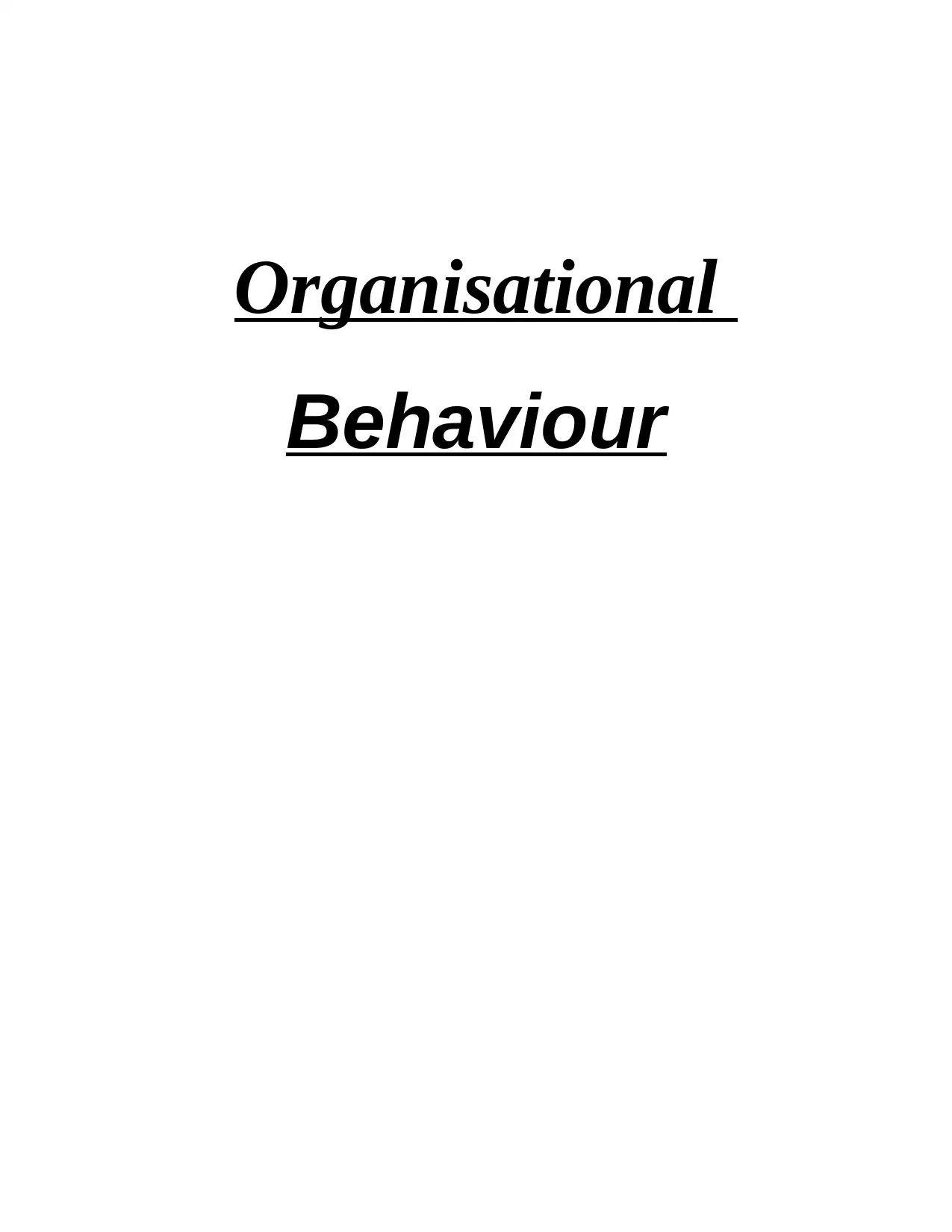
Organisational
Behaviour
Behaviour
Paraphrase This Document
Need a fresh take? Get an instant paraphrase of this document with our AI Paraphraser
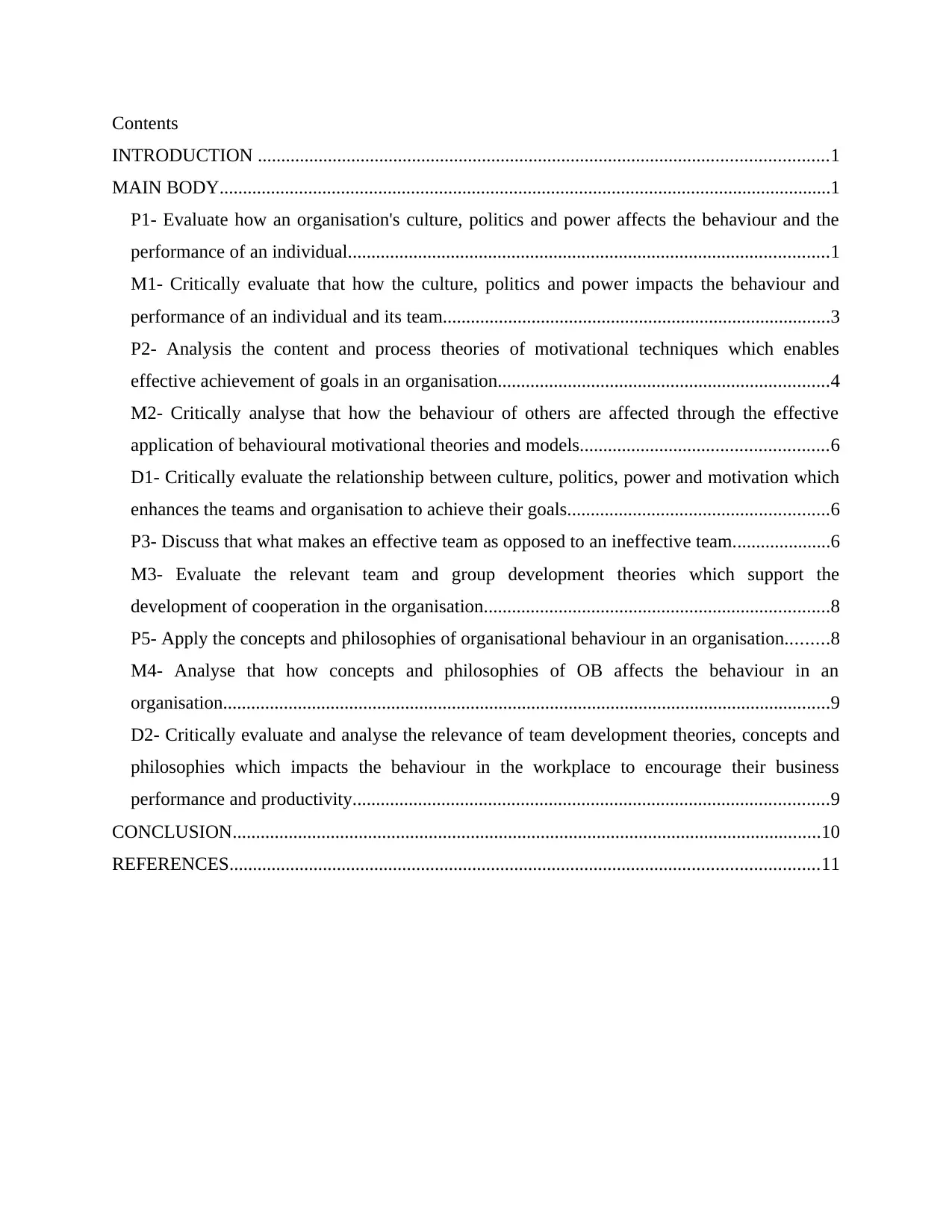
Contents
INTRODUCTION ..........................................................................................................................1
MAIN BODY...................................................................................................................................1
P1- Evaluate how an organisation's culture, politics and power affects the behaviour and the
performance of an individual.......................................................................................................1
M1- Critically evaluate that how the culture, politics and power impacts the behaviour and
performance of an individual and its team...................................................................................3
P2- Analysis the content and process theories of motivational techniques which enables
effective achievement of goals in an organisation.......................................................................4
M2- Critically analyse that how the behaviour of others are affected through the effective
application of behavioural motivational theories and models.....................................................6
D1- Critically evaluate the relationship between culture, politics, power and motivation which
enhances the teams and organisation to achieve their goals........................................................6
P3- Discuss that what makes an effective team as opposed to an ineffective team.....................6
M3- Evaluate the relevant team and group development theories which support the
development of cooperation in the organisation..........................................................................8
P5- Apply the concepts and philosophies of organisational behaviour in an organisation.........8
M4- Analyse that how concepts and philosophies of OB affects the behaviour in an
organisation..................................................................................................................................9
D2- Critically evaluate and analyse the relevance of team development theories, concepts and
philosophies which impacts the behaviour in the workplace to encourage their business
performance and productivity......................................................................................................9
CONCLUSION..............................................................................................................................10
REFERENCES..............................................................................................................................11
INTRODUCTION ..........................................................................................................................1
MAIN BODY...................................................................................................................................1
P1- Evaluate how an organisation's culture, politics and power affects the behaviour and the
performance of an individual.......................................................................................................1
M1- Critically evaluate that how the culture, politics and power impacts the behaviour and
performance of an individual and its team...................................................................................3
P2- Analysis the content and process theories of motivational techniques which enables
effective achievement of goals in an organisation.......................................................................4
M2- Critically analyse that how the behaviour of others are affected through the effective
application of behavioural motivational theories and models.....................................................6
D1- Critically evaluate the relationship between culture, politics, power and motivation which
enhances the teams and organisation to achieve their goals........................................................6
P3- Discuss that what makes an effective team as opposed to an ineffective team.....................6
M3- Evaluate the relevant team and group development theories which support the
development of cooperation in the organisation..........................................................................8
P5- Apply the concepts and philosophies of organisational behaviour in an organisation.........8
M4- Analyse that how concepts and philosophies of OB affects the behaviour in an
organisation..................................................................................................................................9
D2- Critically evaluate and analyse the relevance of team development theories, concepts and
philosophies which impacts the behaviour in the workplace to encourage their business
performance and productivity......................................................................................................9
CONCLUSION..............................................................................................................................10
REFERENCES..............................................................................................................................11
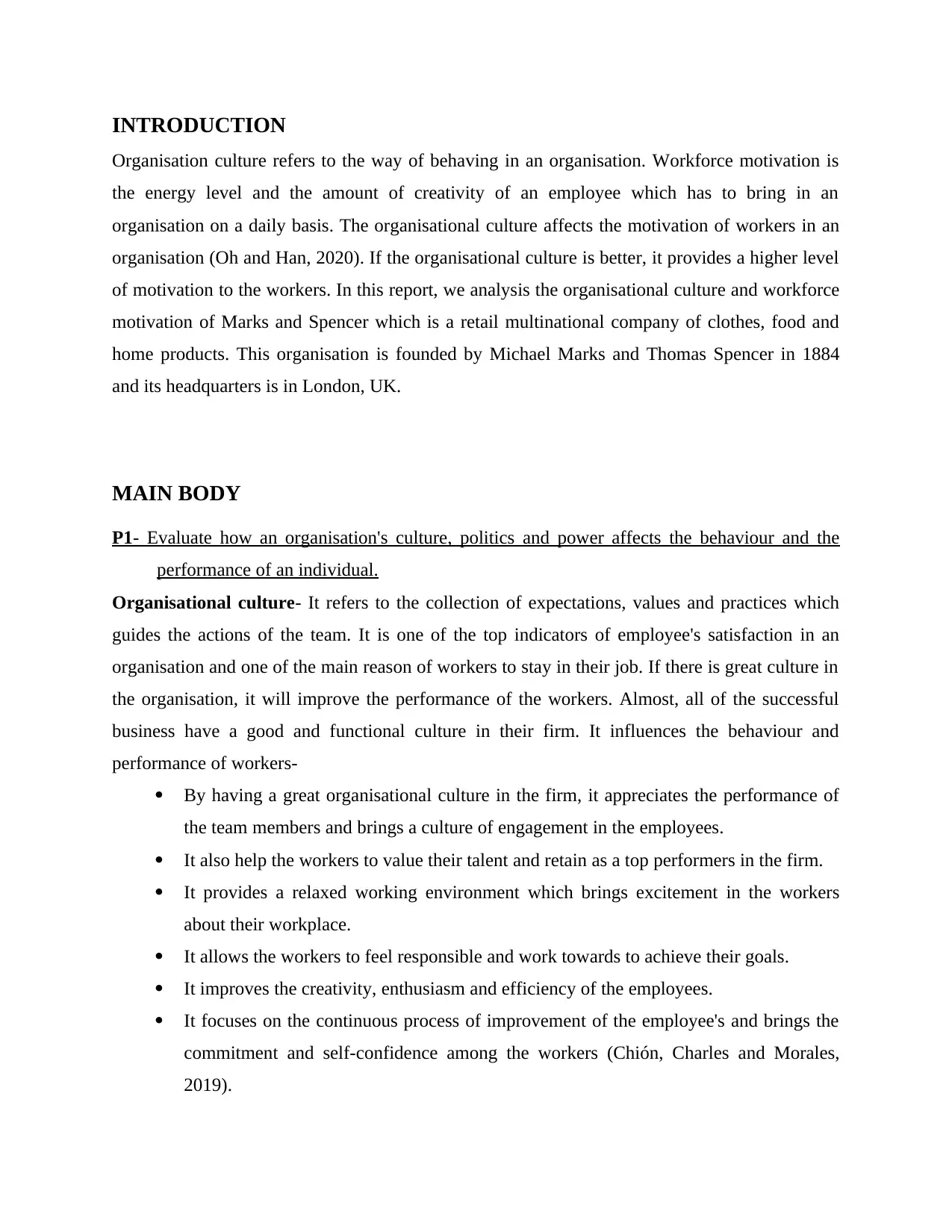
INTRODUCTION
Organisation culture refers to the way of behaving in an organisation. Workforce motivation is
the energy level and the amount of creativity of an employee which has to bring in an
organisation on a daily basis. The organisational culture affects the motivation of workers in an
organisation (Oh and Han, 2020). If the organisational culture is better, it provides a higher level
of motivation to the workers. In this report, we analysis the organisational culture and workforce
motivation of Marks and Spencer which is a retail multinational company of clothes, food and
home products. This organisation is founded by Michael Marks and Thomas Spencer in 1884
and its headquarters is in London, UK.
MAIN BODY
P1- Evaluate how an organisation's culture, politics and power affects the behaviour and the
performance of an individual.
Organisational culture- It refers to the collection of expectations, values and practices which
guides the actions of the team. It is one of the top indicators of employee's satisfaction in an
organisation and one of the main reason of workers to stay in their job. If there is great culture in
the organisation, it will improve the performance of the workers. Almost, all of the successful
business have a good and functional culture in their firm. It influences the behaviour and
performance of workers-
By having a great organisational culture in the firm, it appreciates the performance of
the team members and brings a culture of engagement in the employees.
It also help the workers to value their talent and retain as a top performers in the firm.
It provides a relaxed working environment which brings excitement in the workers
about their workplace.
It allows the workers to feel responsible and work towards to achieve their goals.
It improves the creativity, enthusiasm and efficiency of the employees.
It focuses on the continuous process of improvement of the employee's and brings the
commitment and self-confidence among the workers (Chión, Charles and Morales,
2019).
Organisation culture refers to the way of behaving in an organisation. Workforce motivation is
the energy level and the amount of creativity of an employee which has to bring in an
organisation on a daily basis. The organisational culture affects the motivation of workers in an
organisation (Oh and Han, 2020). If the organisational culture is better, it provides a higher level
of motivation to the workers. In this report, we analysis the organisational culture and workforce
motivation of Marks and Spencer which is a retail multinational company of clothes, food and
home products. This organisation is founded by Michael Marks and Thomas Spencer in 1884
and its headquarters is in London, UK.
MAIN BODY
P1- Evaluate how an organisation's culture, politics and power affects the behaviour and the
performance of an individual.
Organisational culture- It refers to the collection of expectations, values and practices which
guides the actions of the team. It is one of the top indicators of employee's satisfaction in an
organisation and one of the main reason of workers to stay in their job. If there is great culture in
the organisation, it will improve the performance of the workers. Almost, all of the successful
business have a good and functional culture in their firm. It influences the behaviour and
performance of workers-
By having a great organisational culture in the firm, it appreciates the performance of
the team members and brings a culture of engagement in the employees.
It also help the workers to value their talent and retain as a top performers in the firm.
It provides a relaxed working environment which brings excitement in the workers
about their workplace.
It allows the workers to feel responsible and work towards to achieve their goals.
It improves the creativity, enthusiasm and efficiency of the employees.
It focuses on the continuous process of improvement of the employee's and brings the
commitment and self-confidence among the workers (Chión, Charles and Morales,
2019).
⊘ This is a preview!⊘
Do you want full access?
Subscribe today to unlock all pages.

Trusted by 1+ million students worldwide
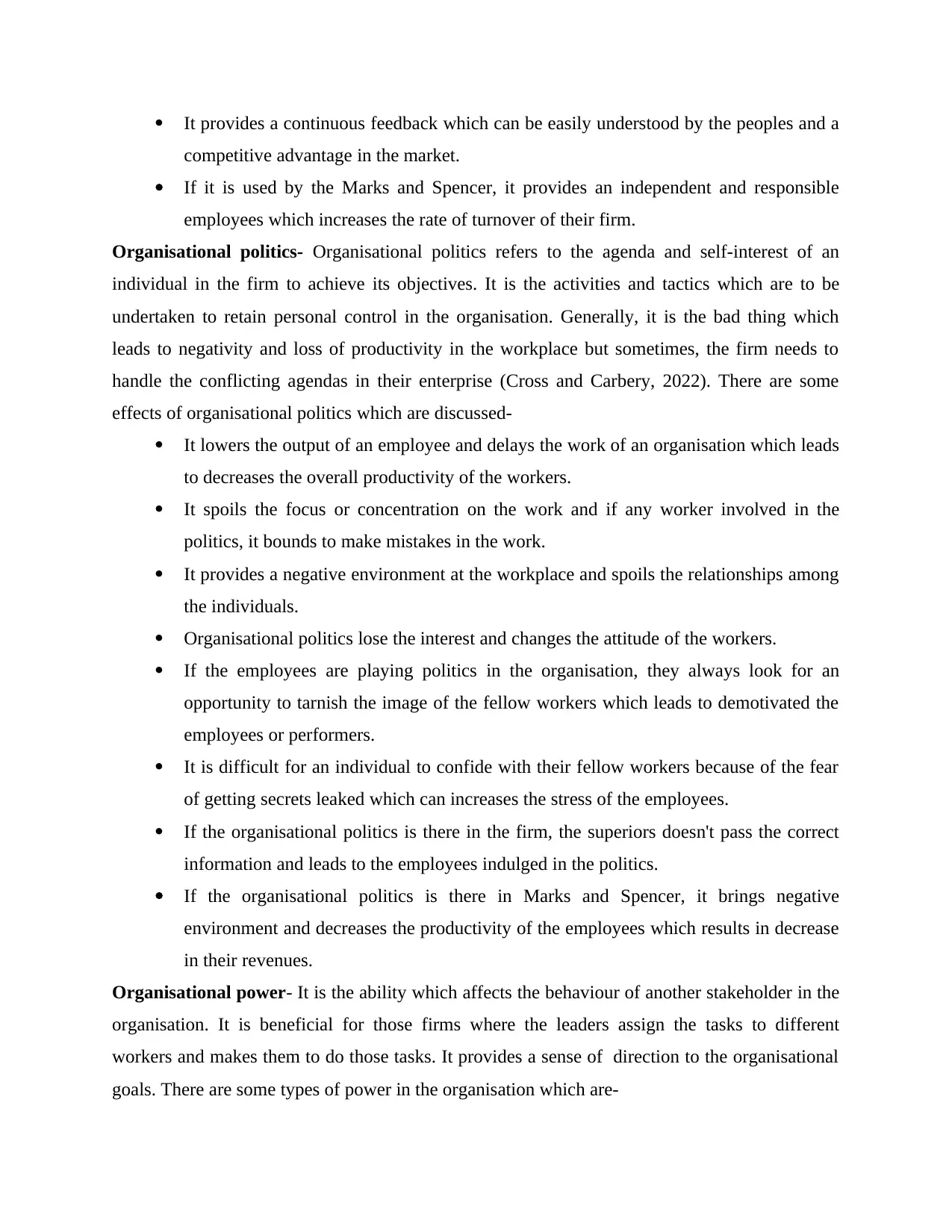
It provides a continuous feedback which can be easily understood by the peoples and a
competitive advantage in the market.
If it is used by the Marks and Spencer, it provides an independent and responsible
employees which increases the rate of turnover of their firm.
Organisational politics- Organisational politics refers to the agenda and self-interest of an
individual in the firm to achieve its objectives. It is the activities and tactics which are to be
undertaken to retain personal control in the organisation. Generally, it is the bad thing which
leads to negativity and loss of productivity in the workplace but sometimes, the firm needs to
handle the conflicting agendas in their enterprise (Cross and Carbery, 2022). There are some
effects of organisational politics which are discussed-
It lowers the output of an employee and delays the work of an organisation which leads
to decreases the overall productivity of the workers.
It spoils the focus or concentration on the work and if any worker involved in the
politics, it bounds to make mistakes in the work.
It provides a negative environment at the workplace and spoils the relationships among
the individuals.
Organisational politics lose the interest and changes the attitude of the workers.
If the employees are playing politics in the organisation, they always look for an
opportunity to tarnish the image of the fellow workers which leads to demotivated the
employees or performers.
It is difficult for an individual to confide with their fellow workers because of the fear
of getting secrets leaked which can increases the stress of the employees.
If the organisational politics is there in the firm, the superiors doesn't pass the correct
information and leads to the employees indulged in the politics.
If the organisational politics is there in Marks and Spencer, it brings negative
environment and decreases the productivity of the employees which results in decrease
in their revenues.
Organisational power- It is the ability which affects the behaviour of another stakeholder in the
organisation. It is beneficial for those firms where the leaders assign the tasks to different
workers and makes them to do those tasks. It provides a sense of direction to the organisational
goals. There are some types of power in the organisation which are-
competitive advantage in the market.
If it is used by the Marks and Spencer, it provides an independent and responsible
employees which increases the rate of turnover of their firm.
Organisational politics- Organisational politics refers to the agenda and self-interest of an
individual in the firm to achieve its objectives. It is the activities and tactics which are to be
undertaken to retain personal control in the organisation. Generally, it is the bad thing which
leads to negativity and loss of productivity in the workplace but sometimes, the firm needs to
handle the conflicting agendas in their enterprise (Cross and Carbery, 2022). There are some
effects of organisational politics which are discussed-
It lowers the output of an employee and delays the work of an organisation which leads
to decreases the overall productivity of the workers.
It spoils the focus or concentration on the work and if any worker involved in the
politics, it bounds to make mistakes in the work.
It provides a negative environment at the workplace and spoils the relationships among
the individuals.
Organisational politics lose the interest and changes the attitude of the workers.
If the employees are playing politics in the organisation, they always look for an
opportunity to tarnish the image of the fellow workers which leads to demotivated the
employees or performers.
It is difficult for an individual to confide with their fellow workers because of the fear
of getting secrets leaked which can increases the stress of the employees.
If the organisational politics is there in the firm, the superiors doesn't pass the correct
information and leads to the employees indulged in the politics.
If the organisational politics is there in Marks and Spencer, it brings negative
environment and decreases the productivity of the employees which results in decrease
in their revenues.
Organisational power- It is the ability which affects the behaviour of another stakeholder in the
organisation. It is beneficial for those firms where the leaders assign the tasks to different
workers and makes them to do those tasks. It provides a sense of direction to the organisational
goals. There are some types of power in the organisation which are-
Paraphrase This Document
Need a fresh take? Get an instant paraphrase of this document with our AI Paraphraser
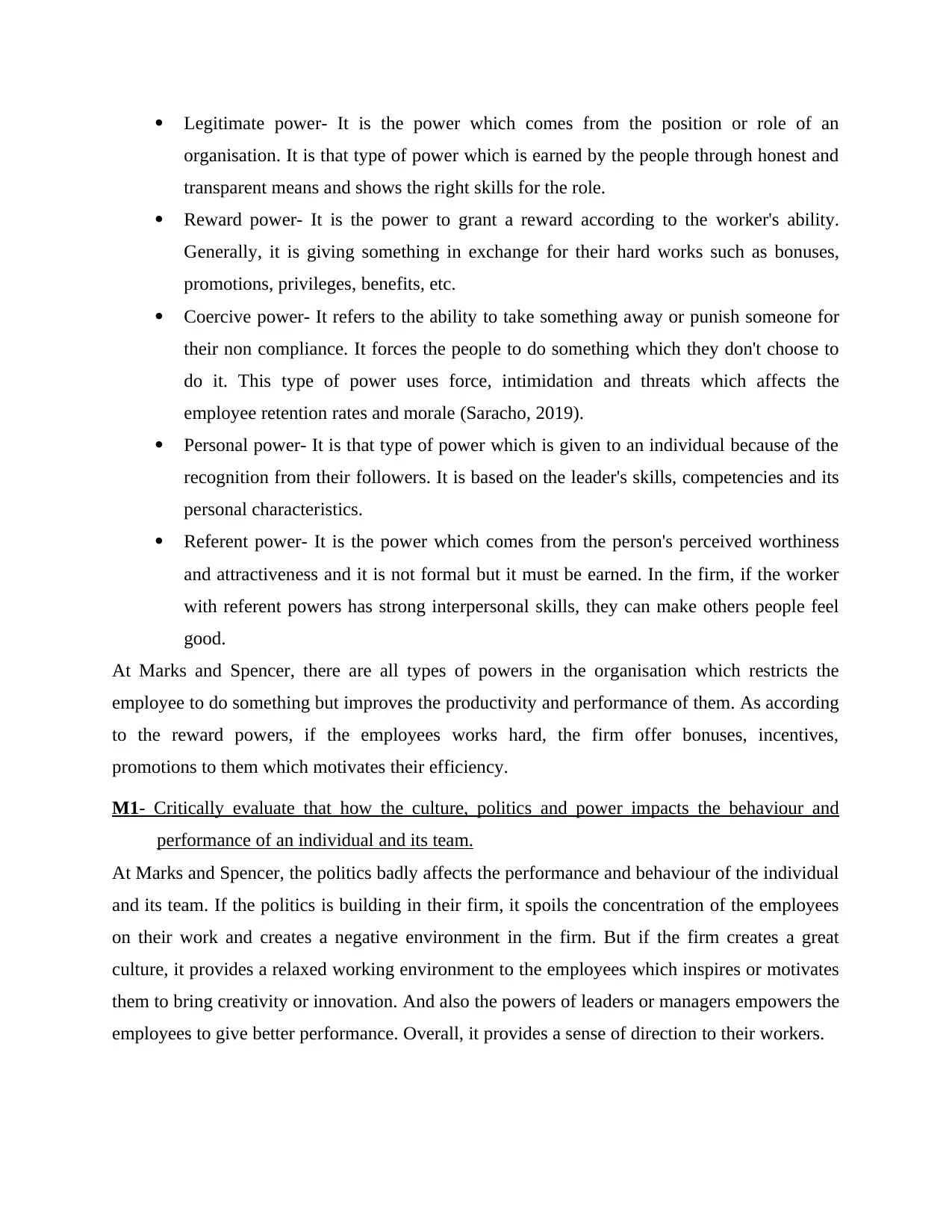
Legitimate power- It is the power which comes from the position or role of an
organisation. It is that type of power which is earned by the people through honest and
transparent means and shows the right skills for the role.
Reward power- It is the power to grant a reward according to the worker's ability.
Generally, it is giving something in exchange for their hard works such as bonuses,
promotions, privileges, benefits, etc.
Coercive power- It refers to the ability to take something away or punish someone for
their non compliance. It forces the people to do something which they don't choose to
do it. This type of power uses force, intimidation and threats which affects the
employee retention rates and morale (Saracho, 2019).
Personal power- It is that type of power which is given to an individual because of the
recognition from their followers. It is based on the leader's skills, competencies and its
personal characteristics.
Referent power- It is the power which comes from the person's perceived worthiness
and attractiveness and it is not formal but it must be earned. In the firm, if the worker
with referent powers has strong interpersonal skills, they can make others people feel
good.
At Marks and Spencer, there are all types of powers in the organisation which restricts the
employee to do something but improves the productivity and performance of them. As according
to the reward powers, if the employees works hard, the firm offer bonuses, incentives,
promotions to them which motivates their efficiency.
M1- Critically evaluate that how the culture, politics and power impacts the behaviour and
performance of an individual and its team.
At Marks and Spencer, the politics badly affects the performance and behaviour of the individual
and its team. If the politics is building in their firm, it spoils the concentration of the employees
on their work and creates a negative environment in the firm. But if the firm creates a great
culture, it provides a relaxed working environment to the employees which inspires or motivates
them to bring creativity or innovation. And also the powers of leaders or managers empowers the
employees to give better performance. Overall, it provides a sense of direction to their workers.
organisation. It is that type of power which is earned by the people through honest and
transparent means and shows the right skills for the role.
Reward power- It is the power to grant a reward according to the worker's ability.
Generally, it is giving something in exchange for their hard works such as bonuses,
promotions, privileges, benefits, etc.
Coercive power- It refers to the ability to take something away or punish someone for
their non compliance. It forces the people to do something which they don't choose to
do it. This type of power uses force, intimidation and threats which affects the
employee retention rates and morale (Saracho, 2019).
Personal power- It is that type of power which is given to an individual because of the
recognition from their followers. It is based on the leader's skills, competencies and its
personal characteristics.
Referent power- It is the power which comes from the person's perceived worthiness
and attractiveness and it is not formal but it must be earned. In the firm, if the worker
with referent powers has strong interpersonal skills, they can make others people feel
good.
At Marks and Spencer, there are all types of powers in the organisation which restricts the
employee to do something but improves the productivity and performance of them. As according
to the reward powers, if the employees works hard, the firm offer bonuses, incentives,
promotions to them which motivates their efficiency.
M1- Critically evaluate that how the culture, politics and power impacts the behaviour and
performance of an individual and its team.
At Marks and Spencer, the politics badly affects the performance and behaviour of the individual
and its team. If the politics is building in their firm, it spoils the concentration of the employees
on their work and creates a negative environment in the firm. But if the firm creates a great
culture, it provides a relaxed working environment to the employees which inspires or motivates
them to bring creativity or innovation. And also the powers of leaders or managers empowers the
employees to give better performance. Overall, it provides a sense of direction to their workers.
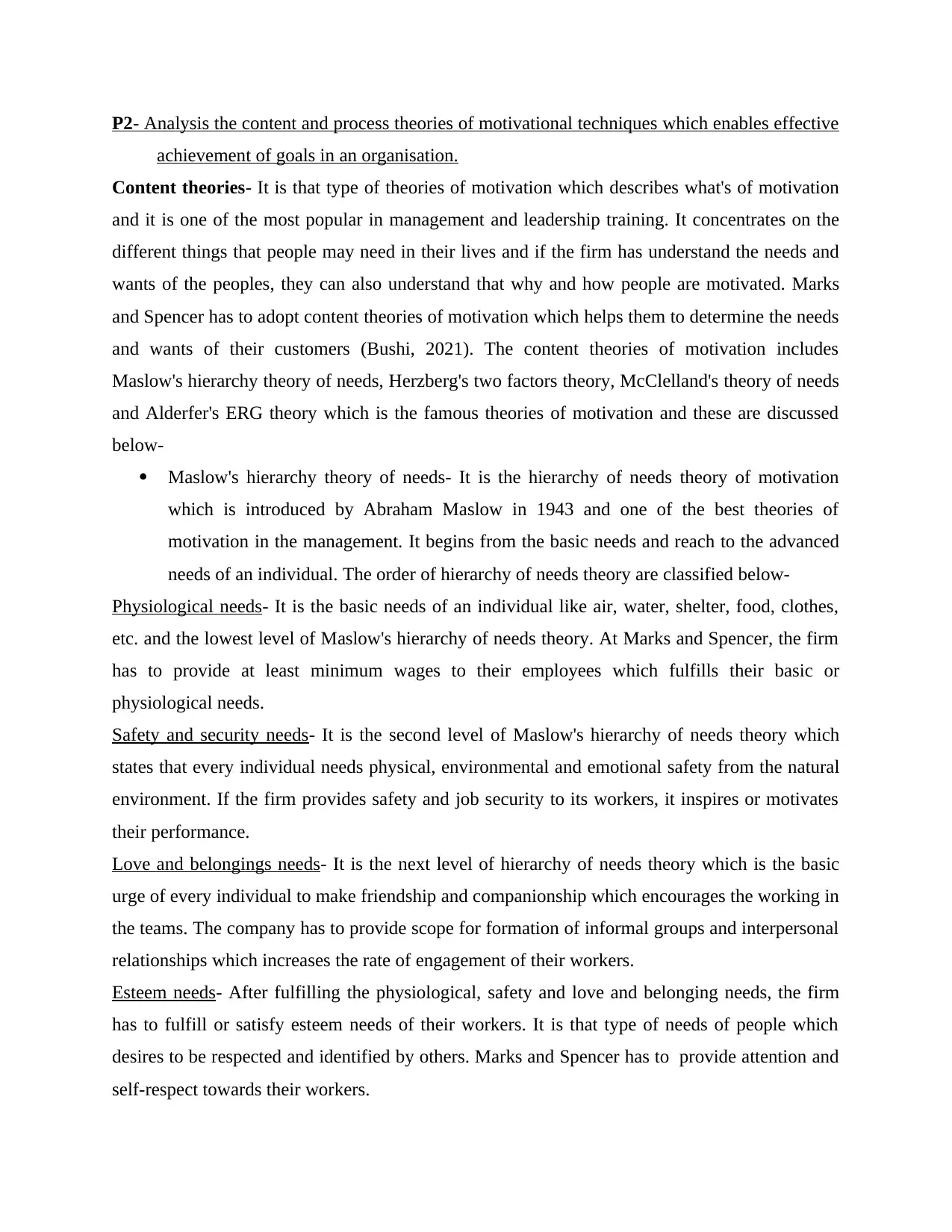
P2- Analysis the content and process theories of motivational techniques which enables effective
achievement of goals in an organisation.
Content theories- It is that type of theories of motivation which describes what's of motivation
and it is one of the most popular in management and leadership training. It concentrates on the
different things that people may need in their lives and if the firm has understand the needs and
wants of the peoples, they can also understand that why and how people are motivated. Marks
and Spencer has to adopt content theories of motivation which helps them to determine the needs
and wants of their customers (Bushi, 2021). The content theories of motivation includes
Maslow's hierarchy theory of needs, Herzberg's two factors theory, McClelland's theory of needs
and Alderfer's ERG theory which is the famous theories of motivation and these are discussed
below-
Maslow's hierarchy theory of needs- It is the hierarchy of needs theory of motivation
which is introduced by Abraham Maslow in 1943 and one of the best theories of
motivation in the management. It begins from the basic needs and reach to the advanced
needs of an individual. The order of hierarchy of needs theory are classified below-
Physiological needs- It is the basic needs of an individual like air, water, shelter, food, clothes,
etc. and the lowest level of Maslow's hierarchy of needs theory. At Marks and Spencer, the firm
has to provide at least minimum wages to their employees which fulfills their basic or
physiological needs.
Safety and security needs- It is the second level of Maslow's hierarchy of needs theory which
states that every individual needs physical, environmental and emotional safety from the natural
environment. If the firm provides safety and job security to its workers, it inspires or motivates
their performance.
Love and belongings needs- It is the next level of hierarchy of needs theory which is the basic
urge of every individual to make friendship and companionship which encourages the working in
the teams. The company has to provide scope for formation of informal groups and interpersonal
relationships which increases the rate of engagement of their workers.
Esteem needs- After fulfilling the physiological, safety and love and belonging needs, the firm
has to fulfill or satisfy esteem needs of their workers. It is that type of needs of people which
desires to be respected and identified by others. Marks and Spencer has to provide attention and
self-respect towards their workers.
achievement of goals in an organisation.
Content theories- It is that type of theories of motivation which describes what's of motivation
and it is one of the most popular in management and leadership training. It concentrates on the
different things that people may need in their lives and if the firm has understand the needs and
wants of the peoples, they can also understand that why and how people are motivated. Marks
and Spencer has to adopt content theories of motivation which helps them to determine the needs
and wants of their customers (Bushi, 2021). The content theories of motivation includes
Maslow's hierarchy theory of needs, Herzberg's two factors theory, McClelland's theory of needs
and Alderfer's ERG theory which is the famous theories of motivation and these are discussed
below-
Maslow's hierarchy theory of needs- It is the hierarchy of needs theory of motivation
which is introduced by Abraham Maslow in 1943 and one of the best theories of
motivation in the management. It begins from the basic needs and reach to the advanced
needs of an individual. The order of hierarchy of needs theory are classified below-
Physiological needs- It is the basic needs of an individual like air, water, shelter, food, clothes,
etc. and the lowest level of Maslow's hierarchy of needs theory. At Marks and Spencer, the firm
has to provide at least minimum wages to their employees which fulfills their basic or
physiological needs.
Safety and security needs- It is the second level of Maslow's hierarchy of needs theory which
states that every individual needs physical, environmental and emotional safety from the natural
environment. If the firm provides safety and job security to its workers, it inspires or motivates
their performance.
Love and belongings needs- It is the next level of hierarchy of needs theory which is the basic
urge of every individual to make friendship and companionship which encourages the working in
the teams. The company has to provide scope for formation of informal groups and interpersonal
relationships which increases the rate of engagement of their workers.
Esteem needs- After fulfilling the physiological, safety and love and belonging needs, the firm
has to fulfill or satisfy esteem needs of their workers. It is that type of needs of people which
desires to be respected and identified by others. Marks and Spencer has to provide attention and
self-respect towards their workers.
⊘ This is a preview!⊘
Do you want full access?
Subscribe today to unlock all pages.

Trusted by 1+ million students worldwide
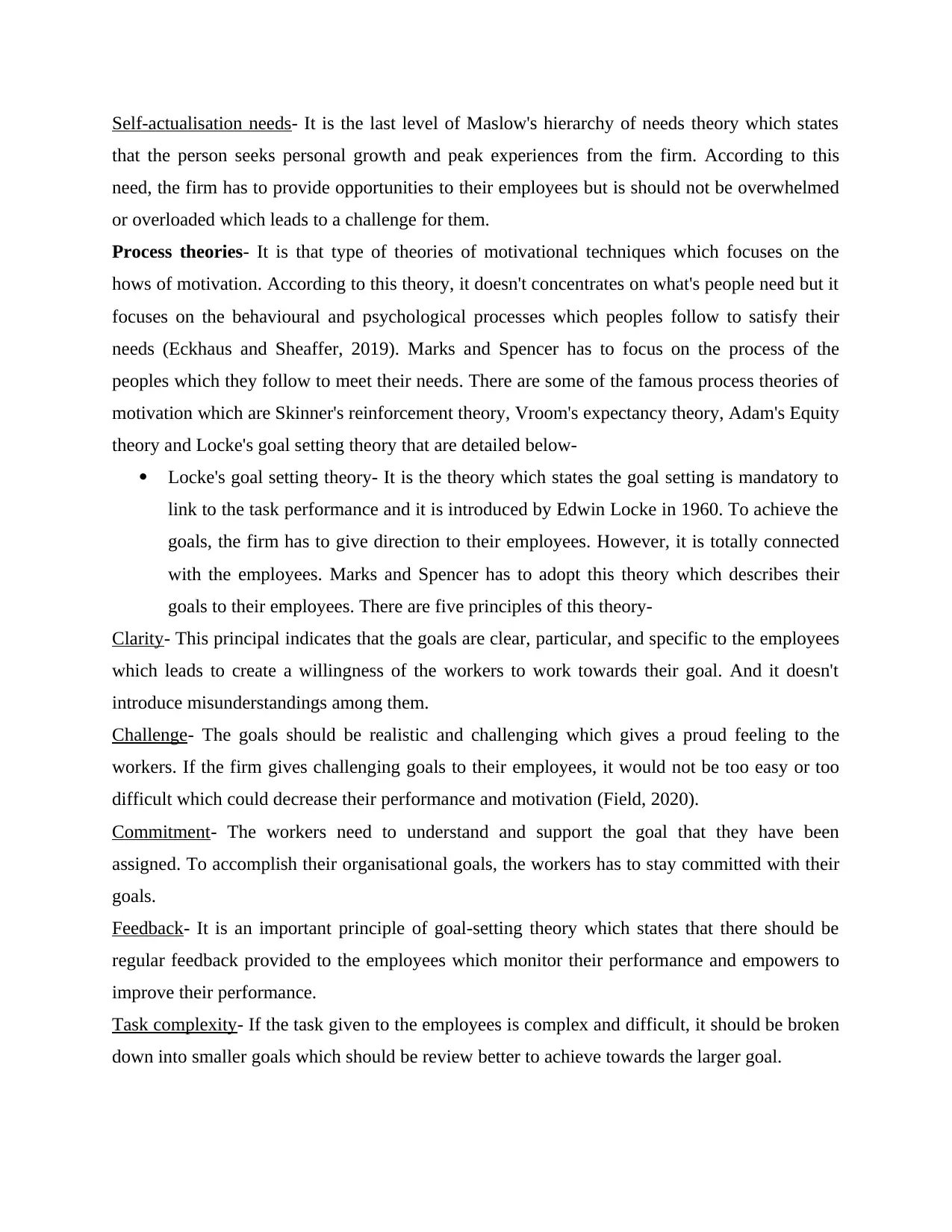
Self-actualisation needs- It is the last level of Maslow's hierarchy of needs theory which states
that the person seeks personal growth and peak experiences from the firm. According to this
need, the firm has to provide opportunities to their employees but is should not be overwhelmed
or overloaded which leads to a challenge for them.
Process theories- It is that type of theories of motivational techniques which focuses on the
hows of motivation. According to this theory, it doesn't concentrates on what's people need but it
focuses on the behavioural and psychological processes which peoples follow to satisfy their
needs (Eckhaus and Sheaffer, 2019). Marks and Spencer has to focus on the process of the
peoples which they follow to meet their needs. There are some of the famous process theories of
motivation which are Skinner's reinforcement theory, Vroom's expectancy theory, Adam's Equity
theory and Locke's goal setting theory that are detailed below-
Locke's goal setting theory- It is the theory which states the goal setting is mandatory to
link to the task performance and it is introduced by Edwin Locke in 1960. To achieve the
goals, the firm has to give direction to their employees. However, it is totally connected
with the employees. Marks and Spencer has to adopt this theory which describes their
goals to their employees. There are five principles of this theory-
Clarity- This principal indicates that the goals are clear, particular, and specific to the employees
which leads to create a willingness of the workers to work towards their goal. And it doesn't
introduce misunderstandings among them.
Challenge- The goals should be realistic and challenging which gives a proud feeling to the
workers. If the firm gives challenging goals to their employees, it would not be too easy or too
difficult which could decrease their performance and motivation (Field, 2020).
Commitment- The workers need to understand and support the goal that they have been
assigned. To accomplish their organisational goals, the workers has to stay committed with their
goals.
Feedback- It is an important principle of goal-setting theory which states that there should be
regular feedback provided to the employees which monitor their performance and empowers to
improve their performance.
Task complexity- If the task given to the employees is complex and difficult, it should be broken
down into smaller goals which should be review better to achieve towards the larger goal.
that the person seeks personal growth and peak experiences from the firm. According to this
need, the firm has to provide opportunities to their employees but is should not be overwhelmed
or overloaded which leads to a challenge for them.
Process theories- It is that type of theories of motivational techniques which focuses on the
hows of motivation. According to this theory, it doesn't concentrates on what's people need but it
focuses on the behavioural and psychological processes which peoples follow to satisfy their
needs (Eckhaus and Sheaffer, 2019). Marks and Spencer has to focus on the process of the
peoples which they follow to meet their needs. There are some of the famous process theories of
motivation which are Skinner's reinforcement theory, Vroom's expectancy theory, Adam's Equity
theory and Locke's goal setting theory that are detailed below-
Locke's goal setting theory- It is the theory which states the goal setting is mandatory to
link to the task performance and it is introduced by Edwin Locke in 1960. To achieve the
goals, the firm has to give direction to their employees. However, it is totally connected
with the employees. Marks and Spencer has to adopt this theory which describes their
goals to their employees. There are five principles of this theory-
Clarity- This principal indicates that the goals are clear, particular, and specific to the employees
which leads to create a willingness of the workers to work towards their goal. And it doesn't
introduce misunderstandings among them.
Challenge- The goals should be realistic and challenging which gives a proud feeling to the
workers. If the firm gives challenging goals to their employees, it would not be too easy or too
difficult which could decrease their performance and motivation (Field, 2020).
Commitment- The workers need to understand and support the goal that they have been
assigned. To accomplish their organisational goals, the workers has to stay committed with their
goals.
Feedback- It is an important principle of goal-setting theory which states that there should be
regular feedback provided to the employees which monitor their performance and empowers to
improve their performance.
Task complexity- If the task given to the employees is complex and difficult, it should be broken
down into smaller goals which should be review better to achieve towards the larger goal.
Paraphrase This Document
Need a fresh take? Get an instant paraphrase of this document with our AI Paraphraser
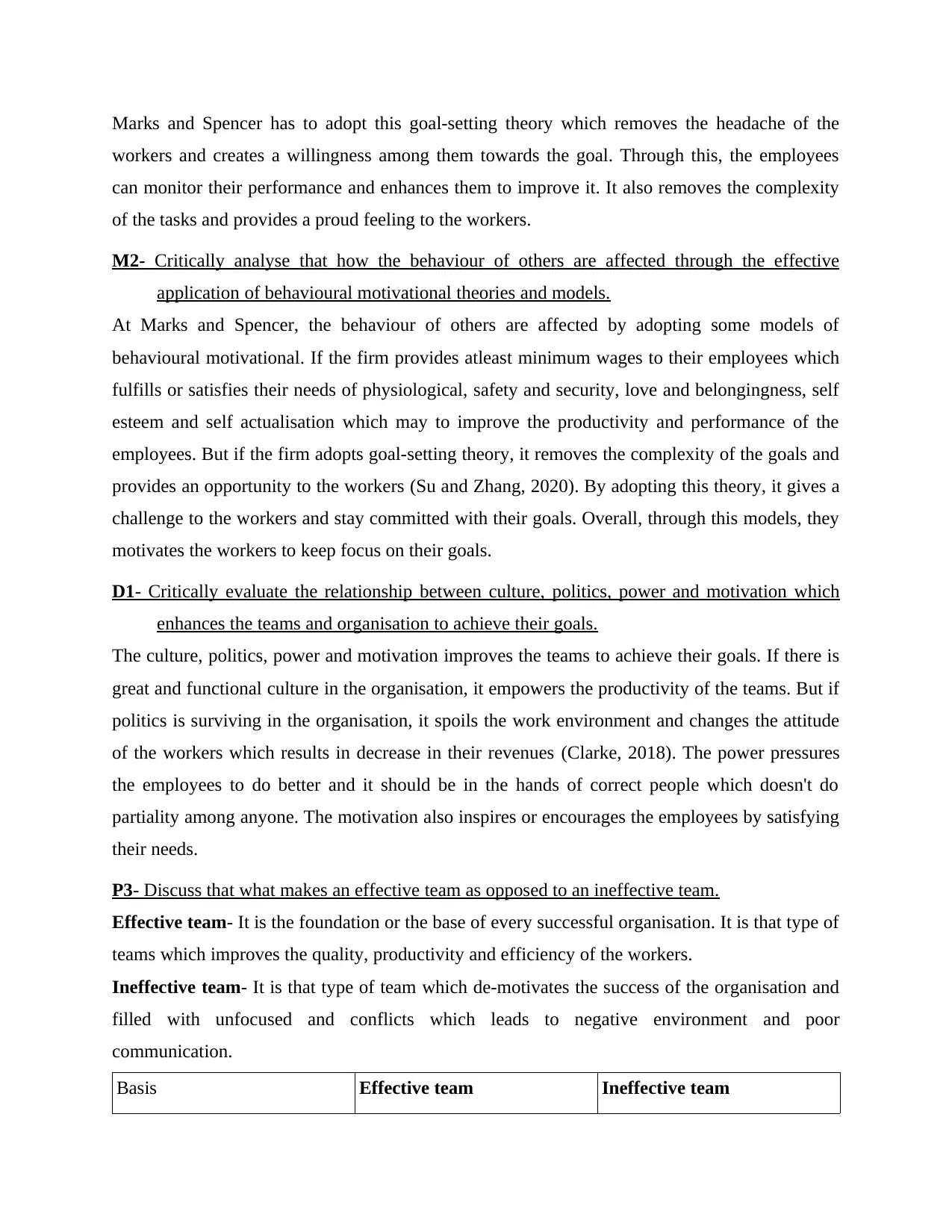
Marks and Spencer has to adopt this goal-setting theory which removes the headache of the
workers and creates a willingness among them towards the goal. Through this, the employees
can monitor their performance and enhances them to improve it. It also removes the complexity
of the tasks and provides a proud feeling to the workers.
M2- Critically analyse that how the behaviour of others are affected through the effective
application of behavioural motivational theories and models.
At Marks and Spencer, the behaviour of others are affected by adopting some models of
behavioural motivational. If the firm provides atleast minimum wages to their employees which
fulfills or satisfies their needs of physiological, safety and security, love and belongingness, self
esteem and self actualisation which may to improve the productivity and performance of the
employees. But if the firm adopts goal-setting theory, it removes the complexity of the goals and
provides an opportunity to the workers (Su and Zhang, 2020). By adopting this theory, it gives a
challenge to the workers and stay committed with their goals. Overall, through this models, they
motivates the workers to keep focus on their goals.
D1- Critically evaluate the relationship between culture, politics, power and motivation which
enhances the teams and organisation to achieve their goals.
The culture, politics, power and motivation improves the teams to achieve their goals. If there is
great and functional culture in the organisation, it empowers the productivity of the teams. But if
politics is surviving in the organisation, it spoils the work environment and changes the attitude
of the workers which results in decrease in their revenues (Clarke, 2018). The power pressures
the employees to do better and it should be in the hands of correct people which doesn't do
partiality among anyone. The motivation also inspires or encourages the employees by satisfying
their needs.
P3- Discuss that what makes an effective team as opposed to an ineffective team.
Effective team- It is the foundation or the base of every successful organisation. It is that type of
teams which improves the quality, productivity and efficiency of the workers.
Ineffective team- It is that type of team which de-motivates the success of the organisation and
filled with unfocused and conflicts which leads to negative environment and poor
communication.
Basis Effective team Ineffective team
workers and creates a willingness among them towards the goal. Through this, the employees
can monitor their performance and enhances them to improve it. It also removes the complexity
of the tasks and provides a proud feeling to the workers.
M2- Critically analyse that how the behaviour of others are affected through the effective
application of behavioural motivational theories and models.
At Marks and Spencer, the behaviour of others are affected by adopting some models of
behavioural motivational. If the firm provides atleast minimum wages to their employees which
fulfills or satisfies their needs of physiological, safety and security, love and belongingness, self
esteem and self actualisation which may to improve the productivity and performance of the
employees. But if the firm adopts goal-setting theory, it removes the complexity of the goals and
provides an opportunity to the workers (Su and Zhang, 2020). By adopting this theory, it gives a
challenge to the workers and stay committed with their goals. Overall, through this models, they
motivates the workers to keep focus on their goals.
D1- Critically evaluate the relationship between culture, politics, power and motivation which
enhances the teams and organisation to achieve their goals.
The culture, politics, power and motivation improves the teams to achieve their goals. If there is
great and functional culture in the organisation, it empowers the productivity of the teams. But if
politics is surviving in the organisation, it spoils the work environment and changes the attitude
of the workers which results in decrease in their revenues (Clarke, 2018). The power pressures
the employees to do better and it should be in the hands of correct people which doesn't do
partiality among anyone. The motivation also inspires or encourages the employees by satisfying
their needs.
P3- Discuss that what makes an effective team as opposed to an ineffective team.
Effective team- It is the foundation or the base of every successful organisation. It is that type of
teams which improves the quality, productivity and efficiency of the workers.
Ineffective team- It is that type of team which de-motivates the success of the organisation and
filled with unfocused and conflicts which leads to negative environment and poor
communication.
Basis Effective team Ineffective team
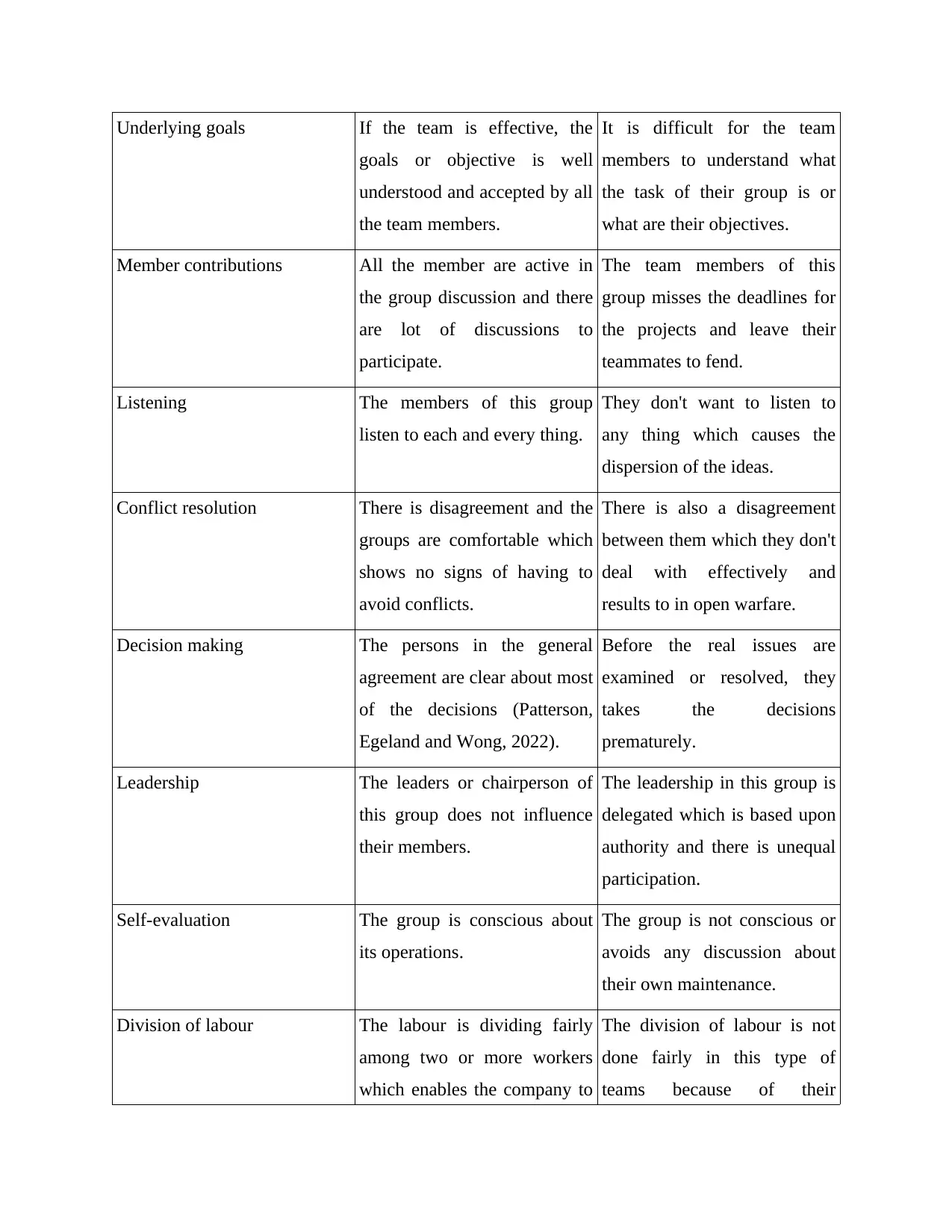
Underlying goals If the team is effective, the
goals or objective is well
understood and accepted by all
the team members.
It is difficult for the team
members to understand what
the task of their group is or
what are their objectives.
Member contributions All the member are active in
the group discussion and there
are lot of discussions to
participate.
The team members of this
group misses the deadlines for
the projects and leave their
teammates to fend.
Listening The members of this group
listen to each and every thing.
They don't want to listen to
any thing which causes the
dispersion of the ideas.
Conflict resolution There is disagreement and the
groups are comfortable which
shows no signs of having to
avoid conflicts.
There is also a disagreement
between them which they don't
deal with effectively and
results to in open warfare.
Decision making The persons in the general
agreement are clear about most
of the decisions (Patterson,
Egeland and Wong, 2022).
Before the real issues are
examined or resolved, they
takes the decisions
prematurely.
Leadership The leaders or chairperson of
this group does not influence
their members.
The leadership in this group is
delegated which is based upon
authority and there is unequal
participation.
Self-evaluation The group is conscious about
its operations.
The group is not conscious or
avoids any discussion about
their own maintenance.
Division of labour The labour is dividing fairly
among two or more workers
which enables the company to
The division of labour is not
done fairly in this type of
teams because of their
goals or objective is well
understood and accepted by all
the team members.
It is difficult for the team
members to understand what
the task of their group is or
what are their objectives.
Member contributions All the member are active in
the group discussion and there
are lot of discussions to
participate.
The team members of this
group misses the deadlines for
the projects and leave their
teammates to fend.
Listening The members of this group
listen to each and every thing.
They don't want to listen to
any thing which causes the
dispersion of the ideas.
Conflict resolution There is disagreement and the
groups are comfortable which
shows no signs of having to
avoid conflicts.
There is also a disagreement
between them which they don't
deal with effectively and
results to in open warfare.
Decision making The persons in the general
agreement are clear about most
of the decisions (Patterson,
Egeland and Wong, 2022).
Before the real issues are
examined or resolved, they
takes the decisions
prematurely.
Leadership The leaders or chairperson of
this group does not influence
their members.
The leadership in this group is
delegated which is based upon
authority and there is unequal
participation.
Self-evaluation The group is conscious about
its operations.
The group is not conscious or
avoids any discussion about
their own maintenance.
Division of labour The labour is dividing fairly
among two or more workers
which enables the company to
The division of labour is not
done fairly in this type of
teams because of their
⊘ This is a preview!⊘
Do you want full access?
Subscribe today to unlock all pages.

Trusted by 1+ million students worldwide
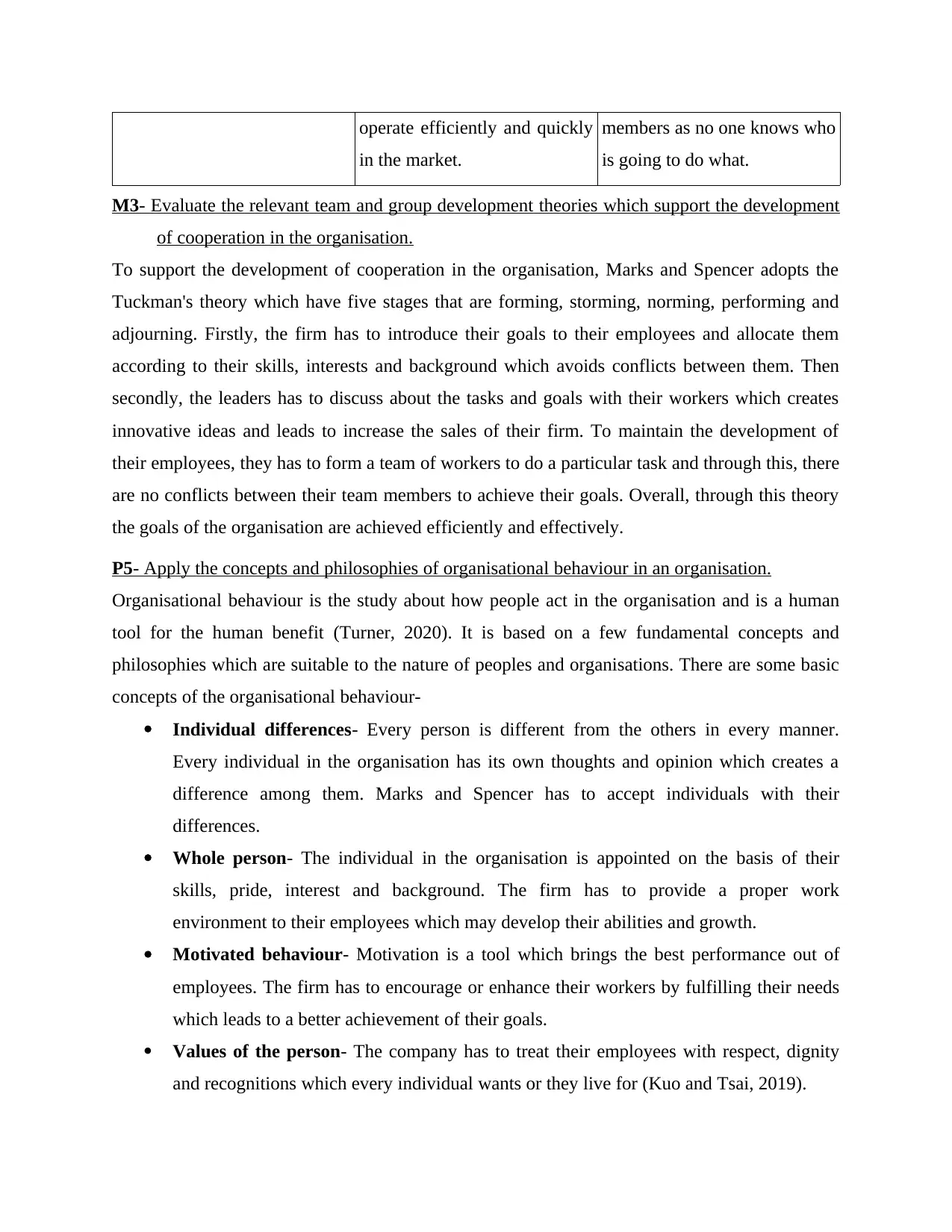
operate efficiently and quickly
in the market.
members as no one knows who
is going to do what.
M3- Evaluate the relevant team and group development theories which support the development
of cooperation in the organisation.
To support the development of cooperation in the organisation, Marks and Spencer adopts the
Tuckman's theory which have five stages that are forming, storming, norming, performing and
adjourning. Firstly, the firm has to introduce their goals to their employees and allocate them
according to their skills, interests and background which avoids conflicts between them. Then
secondly, the leaders has to discuss about the tasks and goals with their workers which creates
innovative ideas and leads to increase the sales of their firm. To maintain the development of
their employees, they has to form a team of workers to do a particular task and through this, there
are no conflicts between their team members to achieve their goals. Overall, through this theory
the goals of the organisation are achieved efficiently and effectively.
P5- Apply the concepts and philosophies of organisational behaviour in an organisation.
Organisational behaviour is the study about how people act in the organisation and is a human
tool for the human benefit (Turner, 2020). It is based on a few fundamental concepts and
philosophies which are suitable to the nature of peoples and organisations. There are some basic
concepts of the organisational behaviour-
Individual differences- Every person is different from the others in every manner.
Every individual in the organisation has its own thoughts and opinion which creates a
difference among them. Marks and Spencer has to accept individuals with their
differences.
Whole person- The individual in the organisation is appointed on the basis of their
skills, pride, interest and background. The firm has to provide a proper work
environment to their employees which may develop their abilities and growth.
Motivated behaviour- Motivation is a tool which brings the best performance out of
employees. The firm has to encourage or enhance their workers by fulfilling their needs
which leads to a better achievement of their goals.
Values of the person- The company has to treat their employees with respect, dignity
and recognitions which every individual wants or they live for (Kuo and Tsai, 2019).
in the market.
members as no one knows who
is going to do what.
M3- Evaluate the relevant team and group development theories which support the development
of cooperation in the organisation.
To support the development of cooperation in the organisation, Marks and Spencer adopts the
Tuckman's theory which have five stages that are forming, storming, norming, performing and
adjourning. Firstly, the firm has to introduce their goals to their employees and allocate them
according to their skills, interests and background which avoids conflicts between them. Then
secondly, the leaders has to discuss about the tasks and goals with their workers which creates
innovative ideas and leads to increase the sales of their firm. To maintain the development of
their employees, they has to form a team of workers to do a particular task and through this, there
are no conflicts between their team members to achieve their goals. Overall, through this theory
the goals of the organisation are achieved efficiently and effectively.
P5- Apply the concepts and philosophies of organisational behaviour in an organisation.
Organisational behaviour is the study about how people act in the organisation and is a human
tool for the human benefit (Turner, 2020). It is based on a few fundamental concepts and
philosophies which are suitable to the nature of peoples and organisations. There are some basic
concepts of the organisational behaviour-
Individual differences- Every person is different from the others in every manner.
Every individual in the organisation has its own thoughts and opinion which creates a
difference among them. Marks and Spencer has to accept individuals with their
differences.
Whole person- The individual in the organisation is appointed on the basis of their
skills, pride, interest and background. The firm has to provide a proper work
environment to their employees which may develop their abilities and growth.
Motivated behaviour- Motivation is a tool which brings the best performance out of
employees. The firm has to encourage or enhance their workers by fulfilling their needs
which leads to a better achievement of their goals.
Values of the person- The company has to treat their employees with respect, dignity
and recognitions which every individual wants or they live for (Kuo and Tsai, 2019).
Paraphrase This Document
Need a fresh take? Get an instant paraphrase of this document with our AI Paraphraser
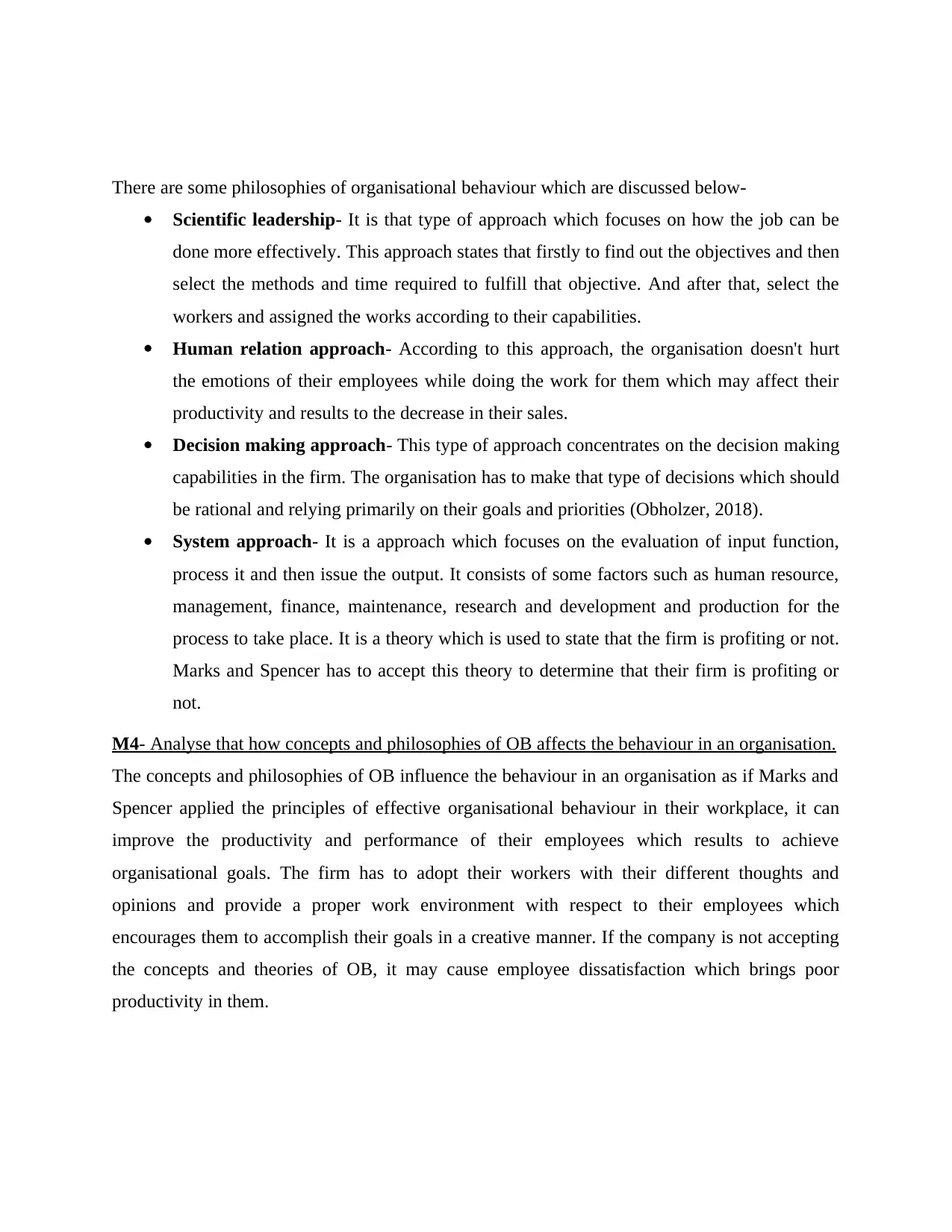
There are some philosophies of organisational behaviour which are discussed below-
Scientific leadership- It is that type of approach which focuses on how the job can be
done more effectively. This approach states that firstly to find out the objectives and then
select the methods and time required to fulfill that objective. And after that, select the
workers and assigned the works according to their capabilities.
Human relation approach- According to this approach, the organisation doesn't hurt
the emotions of their employees while doing the work for them which may affect their
productivity and results to the decrease in their sales.
Decision making approach- This type of approach concentrates on the decision making
capabilities in the firm. The organisation has to make that type of decisions which should
be rational and relying primarily on their goals and priorities (Obholzer, 2018).
System approach- It is a approach which focuses on the evaluation of input function,
process it and then issue the output. It consists of some factors such as human resource,
management, finance, maintenance, research and development and production for the
process to take place. It is a theory which is used to state that the firm is profiting or not.
Marks and Spencer has to accept this theory to determine that their firm is profiting or
not.
M4- Analyse that how concepts and philosophies of OB affects the behaviour in an organisation.
The concepts and philosophies of OB influence the behaviour in an organisation as if Marks and
Spencer applied the principles of effective organisational behaviour in their workplace, it can
improve the productivity and performance of their employees which results to achieve
organisational goals. The firm has to adopt their workers with their different thoughts and
opinions and provide a proper work environment with respect to their employees which
encourages them to accomplish their goals in a creative manner. If the company is not accepting
the concepts and theories of OB, it may cause employee dissatisfaction which brings poor
productivity in them.
Scientific leadership- It is that type of approach which focuses on how the job can be
done more effectively. This approach states that firstly to find out the objectives and then
select the methods and time required to fulfill that objective. And after that, select the
workers and assigned the works according to their capabilities.
Human relation approach- According to this approach, the organisation doesn't hurt
the emotions of their employees while doing the work for them which may affect their
productivity and results to the decrease in their sales.
Decision making approach- This type of approach concentrates on the decision making
capabilities in the firm. The organisation has to make that type of decisions which should
be rational and relying primarily on their goals and priorities (Obholzer, 2018).
System approach- It is a approach which focuses on the evaluation of input function,
process it and then issue the output. It consists of some factors such as human resource,
management, finance, maintenance, research and development and production for the
process to take place. It is a theory which is used to state that the firm is profiting or not.
Marks and Spencer has to accept this theory to determine that their firm is profiting or
not.
M4- Analyse that how concepts and philosophies of OB affects the behaviour in an organisation.
The concepts and philosophies of OB influence the behaviour in an organisation as if Marks and
Spencer applied the principles of effective organisational behaviour in their workplace, it can
improve the productivity and performance of their employees which results to achieve
organisational goals. The firm has to adopt their workers with their different thoughts and
opinions and provide a proper work environment with respect to their employees which
encourages them to accomplish their goals in a creative manner. If the company is not accepting
the concepts and theories of OB, it may cause employee dissatisfaction which brings poor
productivity in them.
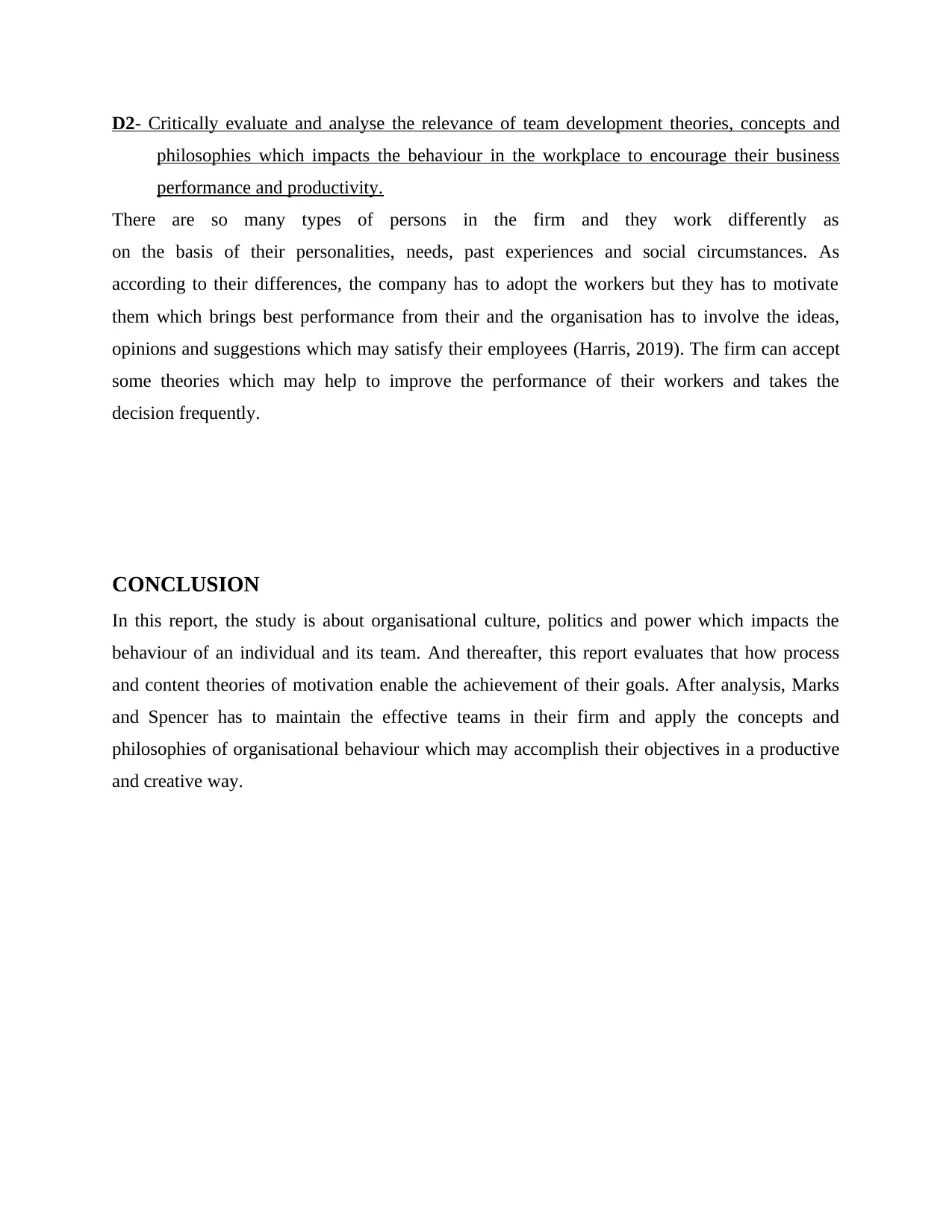
D2- Critically evaluate and analyse the relevance of team development theories, concepts and
philosophies which impacts the behaviour in the workplace to encourage their business
performance and productivity.
There are so many types of persons in the firm and they work differently as
on the basis of their personalities, needs, past experiences and social circumstances. As
according to their differences, the company has to adopt the workers but they has to motivate
them which brings best performance from their and the organisation has to involve the ideas,
opinions and suggestions which may satisfy their employees (Harris, 2019). The firm can accept
some theories which may help to improve the performance of their workers and takes the
decision frequently.
CONCLUSION
In this report, the study is about organisational culture, politics and power which impacts the
behaviour of an individual and its team. And thereafter, this report evaluates that how process
and content theories of motivation enable the achievement of their goals. After analysis, Marks
and Spencer has to maintain the effective teams in their firm and apply the concepts and
philosophies of organisational behaviour which may accomplish their objectives in a productive
and creative way.
philosophies which impacts the behaviour in the workplace to encourage their business
performance and productivity.
There are so many types of persons in the firm and they work differently as
on the basis of their personalities, needs, past experiences and social circumstances. As
according to their differences, the company has to adopt the workers but they has to motivate
them which brings best performance from their and the organisation has to involve the ideas,
opinions and suggestions which may satisfy their employees (Harris, 2019). The firm can accept
some theories which may help to improve the performance of their workers and takes the
decision frequently.
CONCLUSION
In this report, the study is about organisational culture, politics and power which impacts the
behaviour of an individual and its team. And thereafter, this report evaluates that how process
and content theories of motivation enable the achievement of their goals. After analysis, Marks
and Spencer has to maintain the effective teams in their firm and apply the concepts and
philosophies of organisational behaviour which may accomplish their objectives in a productive
and creative way.
⊘ This is a preview!⊘
Do you want full access?
Subscribe today to unlock all pages.

Trusted by 1+ million students worldwide
1 out of 14
Related Documents
Your All-in-One AI-Powered Toolkit for Academic Success.
+13062052269
info@desklib.com
Available 24*7 on WhatsApp / Email
![[object Object]](/_next/static/media/star-bottom.7253800d.svg)
Unlock your academic potential
Copyright © 2020–2026 A2Z Services. All Rights Reserved. Developed and managed by ZUCOL.
